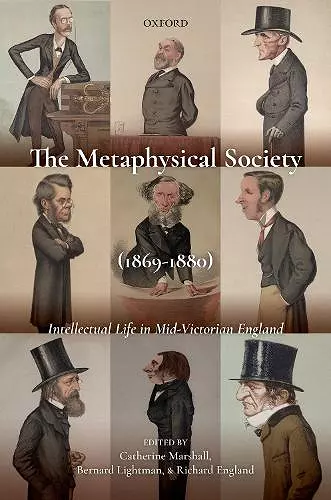The Metaphysical Society (1869-1880)
Intellectual Life in Mid-Victorian England
Catherine Marshall editor Bernard Lightman editor Richard England editor
Format:Hardback
Publisher:Oxford University Press
Published:13th Aug '19
Currently unavailable, and unfortunately no date known when it will be back

The Metaphysical Society was founded in 1869 at the instigation of James Knowles (editor of the Contemporary Review and then of the Nineteenth Century) with a view to 'collect, arrange, and diffuse Knowledge (whether objective or subjective) of mental and moral phenomena' (first resolution of the society in April 1869). The Society was a private dining and debate club that gathered together a latter-day clerisy. Building on the tradition of the Cambridge Apostles, they elected talented members from across the Victorian intellectual spectrum: Bishops, one Cardinal, philosophers, men of science, literary figures, and politicians. The Society included in its 62 members prominent figures such as T. H. Huxley, William Gladstone, Walter Bagehot, Henry Edward Manning, John Ruskin, and Alfred Lord Tennyson. The Metaphysical Society (1869-1880) moves beyond Alan Willard Brown's 1947 pioneering study of the Metaphysical Society by offering a more detailed analysis of its inner dynamics and its larger impact outside the dining room at the Grosvenor Hotel. The contributors shed light on many of the colourful figures that joined the Society as well as the alliances that they formed with fellow members. The collection also examines the major concepts that informed the papers presented at Society meetings. By discussing groups, important individuals, and underlying concepts, the volume contributes to a rich, new picture of Victorian intellectual life during the 1870's, a period when intellectuals were wondering how, and what, to believe in a time of social change, spiritual crisis, and scientific progress.
This volume acts as both an excellent companion book to the three-volume critical edition of The Papers of the Metaphysical Society, as well as a stand-alone introduction to the historical context and ideas discussed in the society. This book comes highly recommended for those invested in the academic study of nineteenth-century British intelligentsia, from whatever methodological angle, be it historical, philosophical, theological, or even sociological. * Elizabeth A. Huddleston, National Institute for Newman Studies *
While this conclusion may have truncated the Society's life, it does not vitiate its significance. The essays in this volume do an excellent job of inserting the Society into a wealth of relevant contexts in late Victorian intellectual and cultural life. Debates within Catholicism, ethics, and evolutionary science are all covered. The histories of journalism and the book are highlighted, naturally because many of the Society's impresarios were cultural mediators and so many of its papers ended up in published form in influential journals edited by members, almost a third of them in the Contemporary Review, carefully tracked by Catherine Marshall. * Peter Mandler, Gonville and Caius College, Cambridge, Cercles: An Interdisciplinary Journal of English Studies *
ISBN: 9780198846499
Dimensions: 241mm x 162mm x 24mm
Weight: 622g
296 pages